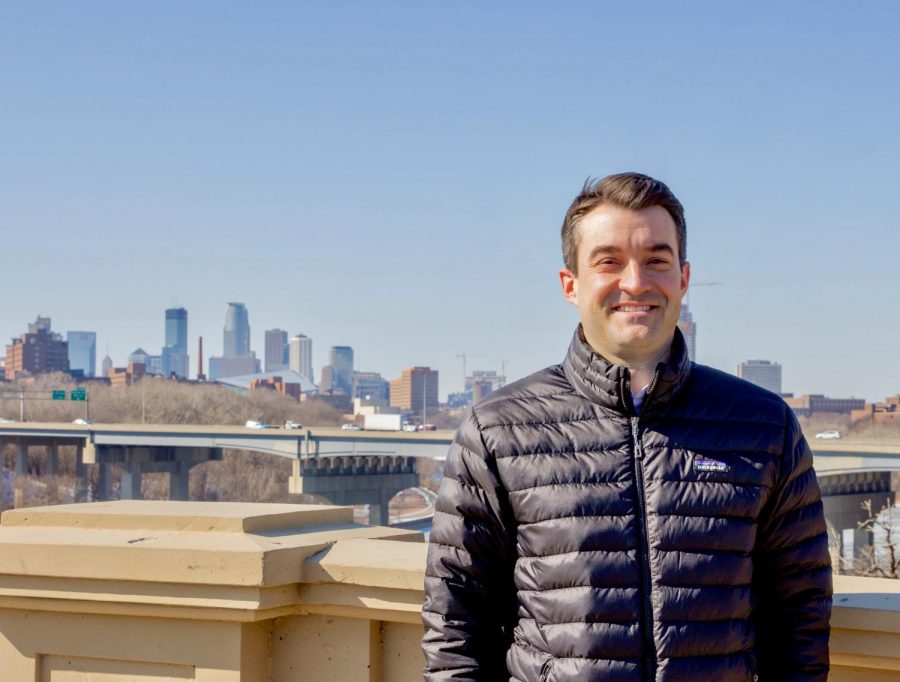Tom Anderson has spent most of his adult life in Ward 2 and has wholly devoted his post-grad life to public service.
He now wants to take that to the City Council, where he runs against incumbent Cam Gordon and challenger Robin Wonsley Worlobah for the Ward 2 seat this November.
Anderson hopes to prioritize public safety, invest in public housing and create green infrastructure in Minneapolis.
His work mostly focused on community organizing and education, and he is currently co-chair of the Longfellow Community Council’s (LCC) Neighborhood Development and Transportation Committee. He has been involved with the LCC for nearly four years. He also serves on an equity advisory committee for Minneapolis Public Schools and is the outreach and inclusion officer for the Senate District 63 DFL.
After starting a family with his wife in Longfellow, Anderson shifted from nearly five years as a social studies teacher to student advocacy work. He currently works as the director of government relations for Students United, where he lobbies lawmakers on behalf of students in Minnesota State colleges. He also works to build student leadership skills among the board of students.
Anderson’s campaign is called “Reimagine Minneapolis,” and Lexi Byler, his coworker at Students United and his director of communications, said this embodies his message.
“It’s not just about Tom; it’s about the community,” Byler said.
A focus on working together
Nearly a year after the police killing of George Floyd and ensuing unrest, Anderson said the city has “very little to show for it.”
He said public safety issues are intersectional and connect to various other crucial problems for the city to address.
This process will involve eradicating the “racism that has permeated the Minneapolis Police Department,” he said, and seeking out root causes of crime, like food insecurity, to solve those issues.
He hopes to invest in assistance for people experiencing homelessness, rather than just arresting them. This would include creating mental health resources and integrating social workers within communities.
“We need to make sure that we’re doing everything we can to make sure … that we rebuild post-pandemic and post-civil unrest in a way that’s equitable and in a way that ensures that our businesses that have existed here can continue to exist here,” Anderson said.
During Anderson’s continued work in government relations, between his role at Students United or numerous campaigns he has worked for, he said he had seen division among local government officials as he would expect in federal politics.
“We’re so divided. Even though almost everyone in Minneapolis is left of center,” Anderson said. “We’re at a point where we’re unable to work together and unable to listen to each other.”
Anderson said he hopes to bring local government back to public service orientation rather than being distracted by political rivalries and outside interests.
“Our diverse opinions in our community and across our city are our strengths of our city,” he said. “We should be able to embrace that.”
From a teacher’s perspective
Anderson grew up in the small town of Pine River just north of Brainerd, Minnesota, and education has always been an important aspect of his life.
He graduated from the University of Minnesota in 2011 with a degree in political science and communications. He later received his Master of Education degree in 2014 from the University. He followed in his mother’s footsteps by becoming a teacher.
After moving off-campus, Anderson has lived in the Longfellow neighborhood for the last seven years. He has continued to be heavily involved in the education system after leaving his teaching career in 2019.
Alexandra Holter said Anderson had strong relationships with the students in the Brooklyn Center school district, where they worked together. Besides teaching, he coached basketball, track and football and was the student council adviser. She said he brought groups together during contentious times.
“One of the most appreciated qualities of Tom during that time was just his very calm, level-headed ability to listen to all sides because passions often run high when we’re talking about student needs,” Holter said. “He just kind of brought us all back to the purpose of what we’re doing, which was to serve the students.”
During his time as an educator, Anderson said he noticed that the students who struggled in his classes were the ones that were affected by means outside of their control, like food insecurity and homelessness.
“Our city is really held to address [these] issues,” Anderson said. “I think that would go a long way to helping close the achievement gap.”
Carlee Diggins, executive director of Students United, said Anderson takes his job as an advocate for students’ needs “very seriously” and has the edge and passion for doing whatever he can to do the right thing.
“He truly understands the importance of the student voice,” Diggins said.
Correction: A previous version of this story incorrectly stated Tom Anderson’s role at the Longfellow Community Council.



















